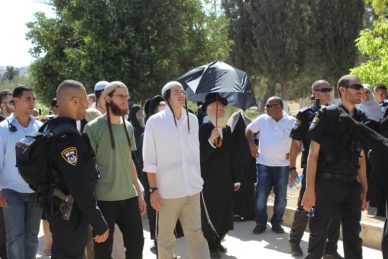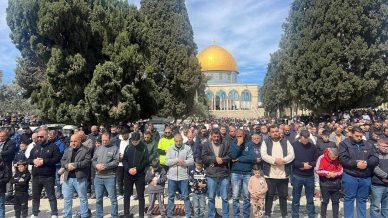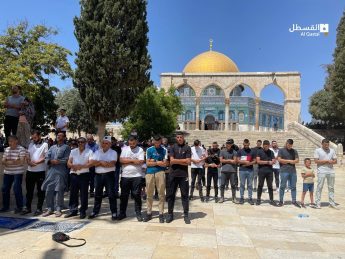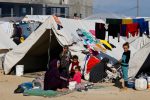OCCUPIED JERUSALEM, (PIC)
Al-Aqsa Mosque witnessed a central incursion by Jewish settlers on Sunday to celebrate what is called the Jewish Purim Festival. The festival will continue on Monday amid warnings of ongoing Israeli plans to exploit such occasions to implement the Israeli agendas of changing the identity of Al-Aqsa and dividing it.
A large number of settlers stormed the courtyards of Al-Aqsa Mosque on Sunday morning, protected by the Israeli police on the first day of the so-called Purim Festival. Israeli police officers emptied the Qibla prayer area of worshipers and those in seclusion (Itikaf) in preparation for the settlers’ continued incursions on Monday in celebration of their alleged holiday.
A project for religious infiltration to change the identity of Al-Aqsa
The Jerusalem affairs researcher, Ziyad Abhays, warned that the Purim Festival, which started on Sunday, and continues until Monday, will be a platform for renewing the approach of aggression against Al-Aqsa, starting from the Torah holidays. It is an occasion for revenge that Israel uses to fuel its war and a renewed attempt to change the identity of Al-Aqsa and enforce division by persistently storming it during the Torah holidays, even when they coincide with Ramadan. Thus, it represents a renewed challenge imposed on the Palestinian people and the entire nation in the face of a religious infiltration project that places Al-Aqsa at the heart of its goals.
Abhays stressed in his statements to the Palestinian Information Center that this overlap between the Purim Festival and the second week of the month of Ramadan renews a series of continuous aggressions over the past five years. In the three years from 2019 to 2021, the Hebrew anniversary of the occupation of Jerusalem, or what is called “Jerusalem Unification Day”, coincided with the 28th day of Ramadan, which led to the start of the Battle of the Sword of Jerusalem on the same evening in 2021. Then, the Passover Festival coincided with the third week of Ramadan in 2022-2023, becoming a headline for tension and escalation in Al-Aqsa, and for confrontation and steadfastness, with seclusion being its central feature, resulting in the Battle of Seclusion in Ramadan 2023. It constituted the first model of multi-front engagement in the Battle of Al-Aqsa and perhaps served as the reconnaissance round before the Al-Aqsa flood on October 7th.
Abhays pointed out that today, with the addition of a month to the Hebrew year to adjust its correspondence with the solar calendar, the Hebrew festival of Purim now stands in contrast to Ramadan. Purim is a marginal holiday compared to the holidays that coincided with Ramadan in the past five years. One of its marginal sources is that it comes one month before the Hebrew Passover. While the Hebrew Passover coincides with the Christian Easter, Purim does not coincide with any holiday in Europe. This has led to a further decline in its significance among the majority of Jews worldwide who are concentrated in Europe. This was already reflected in practice, as the Temple groups used it as a platform to prepare for the aggression of Easter and to renew the assault machine after the long hiatus of the Torah holidays between October and March in the Gregorian calendar.
Diagnosing the risks
Diagnosing the risks, Abhays explained many of the risks facing Al-Aqsa Mosque on this day, saying, “This year, the danger posed by the aggression of Purim can be diagnosed as follows: the renewal of the approach of using the Torah holidays as a platform for aggression against Al-Aqsa. It is the first Torah holiday that comes after the Al-Aqsa Flood Battle, which took place at the end of the previous long holiday season, except for a marginal occasion which is the Hebrew Festival of Lights that occurs in December in the Gregorian calendar, and the hiatus in holidays continues after it.”
Abhays warned that Temple groups see this day as a test of their will, patience, and the ability of religious Zionism to renew the policy of religious substitution in Al-Aqsa, despite the blows Israel has received and continues to receive in the war. It thus represents an important platform for preparing for the Hebrew Passover, which will occur two weeks after Ramadan on April 23, 2024. Temple groups have been eagerly waiting for its intersection with Ramadan, hoping for a better opportunity to impose the Passover sacrifice. The Passover sacrifice in Al-Aqsa is a central theme in their salvationist ideology.
On the other hand, Abhays sees the inherent danger in this day as an occasion to display vengeance against enemies. It perpetuates the Torah myth that portrays how God makes the enemies of the Jews, a sacrifice for His people, The Persian minister, Haman, attempted to massacre the Jews on this day, but he was killed in their midst, and Mordecai, the Jewish man, was appointed as his replacement. In the Zionist mindset today, every Zionist is Mordecai, and every Palestinian is Haman, whom God will make a sacrifice. This turns Hebrew mockery into a station for vengeance and consolation, occurring during a war where these psychological motives serve as the main driving force.
One of the major risks on this day is the reinforcement of division. According to Temple groups and Israel in general, the intersection of a Torah occasion with the month of Ramadan is an opportunity to cement division. It practically affirms that Al-Aqsa is not purely an Islamic holy site but a shared sacred place, and that Islamic control in it is no less than the Jewish one. This amplifies the significance of any occasion that coincides with the month of Ramadan because it simply becomes a window to reinforce the policy that has become at the forefront of Zionist objectives: religious control of Al-Aqsa. The idea of division is just a transitional step along the way.
Confronting the danger
Abhays presented his vision for confronting this danger, stating that the experience since 2013, including the milestones of 2019, 2021, 2022, and 2023, has shown that engaging in i’tikaf -seclusion for worship- on the night before any incursion is a necessary gateway to thwart or at least counter it and prevent the intruders from taking exclusive control of Al-Aqsa. Therefore, i’tikaf became the focal point of the battle in 2023. Consequently, the Israeli police forces seek to prevent and confine it to limited days throughout the year, while the people of Jerusalem and the steadfast ones engage in successive battles to assert it. Specifically, the police forces were keen to invade the Qibli Mosque on Wednesday night to expel the worshipers after Taraweeh prayers and ensure the prevention of i’tikaf before the Thursday incursion on the fasting day that precedes the Hebrew Purim holiday. They repeated the experiment on Saturday night to Sunday, March 24, to ensure the passage of the Torah-themed aggression without retaliation.
Abhays concluded by saying, “What is truly regrettable in this confrontation regarding i’tikaf is the eagerness of the religious endowments to issue a decision on i’tikaf every year as if it is their independent decision, despite the fact that it is prohibited for the public by the occupation police officers and their batons. Moreover, restricting i’tikaf to Thursdays, Fridays, and the last ten nights holds no religious justification and blatantly contradicts the prophetic guidance to frequent the three mosques. How long will this insistence continue? And what benefit is expected from it?”














